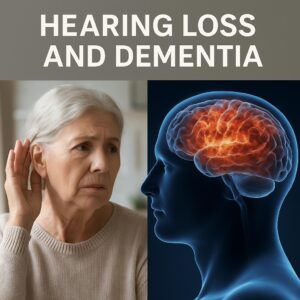The Link Between Hearing Loss and Dementia: Why Early Action Matters

Hearing loss is more than just a communication challenge—it’s increasingly recognised as a significant factor in long-term brain health. Research shows a strong connection between untreated hearing loss and an increased risk of dementia. Understanding this link can help you take proactive steps to protect both your hearing and cognitive wellbeing.
How Hearing Loss Affects the Brain
When you struggle to hear, your brain has to work harder to process sounds and fill in missing information. Over time, this extra strain can affect memory and thinking ability. Here’s how:- Cognitive load: The brain diverts resources from memory and problem-solving to focus on decoding sounds.
- Social isolation: People with hearing loss often withdraw from social interactions, reducing mental stimulation and increasing loneliness—a known risk factor for dementia.
- Brain changes: Studies using brain imaging show that untreated hearing loss can accelerate shrinkage in certain regions of the brain involved in memory and processing.
What the Research Says
- A major study from Johns Hopkins found that mild hearing loss doubled the risk of dementia, moderate hearing loss tripled it, and severe hearing loss increased the risk up to five times.
- Early treatment with hearing aids can significantly reduce this risk by keeping the brain stimulated and engaged.
- Ongoing evidence suggests that protecting your hearing is one of the most effective lifestyle changes you can make for long-term cognitive health.
Recognising the Warning Signs
You may not immediately notice hearing loss, but subtle changes often appear first:- Struggling to follow conversations, especially in groups
- Feeling exhausted after social events due to listening effort
- Turning up the TV or radio louder than others prefer
- Withdrawing from social activities you once enjoyed
How Hearing Aids Can Help
Modern hearing aids do more than amplify sound. They:- Improve communication and reduce listening fatigue
- Keep the brain active and engaged, lowering dementia risk
- Enhance social connections and confidence
- Work with tinnitus therapy features, if needed
Protecting Your Hearing and Your Mind
Simple steps can go a long way:- Schedule regular hearing tests, especially after age 50
- Wear hearing protection in noisy environments
- Stay socially active and mentally engaged
- Address hearing loss early with professional support
